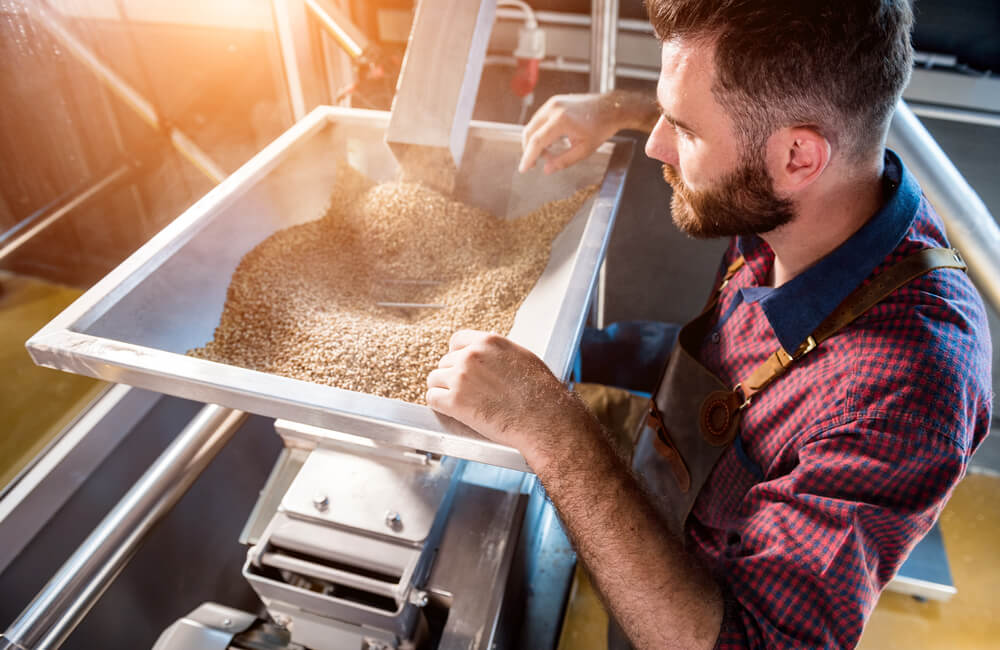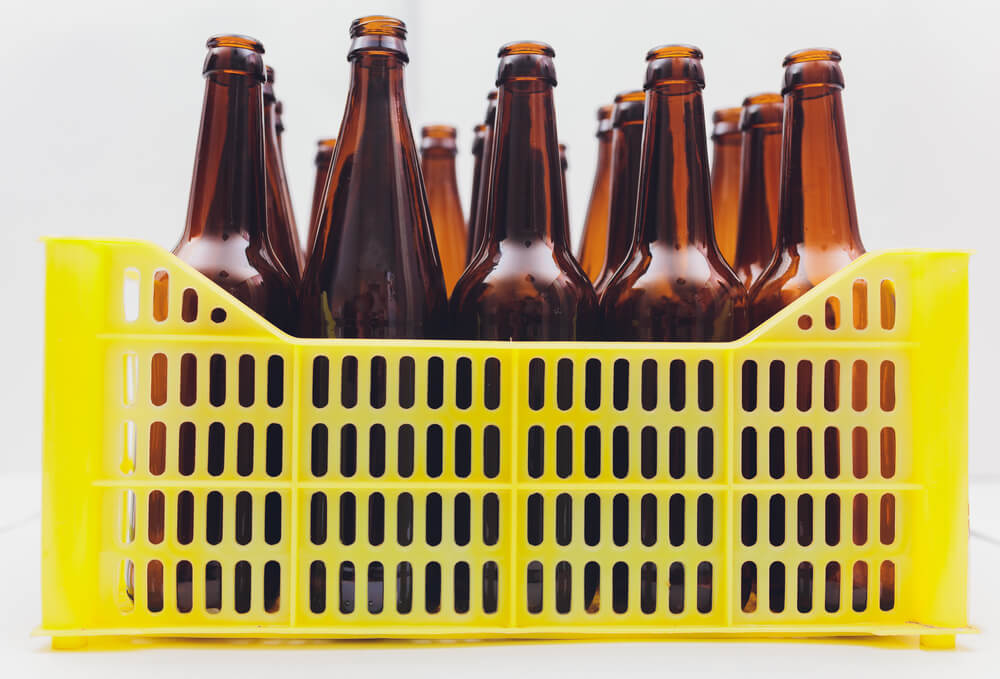In this article, we’ll offer our suggestions for the best grain mill for home brewing.
A great homebrew starts with the right grains. If you’ve been brewing for any amount of time, you’re sure to have noticed that you don’t just dump some grain kernels in your mash tun. Your grains are always milled or crushed. This process breaks open the seed and expose the endosperm which is where the flavors of your grain come from.
For a long time, we brewed from kits, and they come with a bag or three of grains that are already milled. We just poured them in our bag and that was that. As we’ve transitioned to all-grain brewing, we’ve learned that milling is essential, and without a grain mill at home, is also a pain in the neck.
Our local homebrew store has a nice grain room, and we can mill our grains in the store, but the consistency of this process is lacking. Sometimes the mill is set to fine, sometimes the mill is broken, and honestly, if we aren’t brewing the next day, we lose the freshness of the grains.
The answer to our grain problem was to invest in a grain mill. This piece of equipment has made a world of difference in our homebrew experience, and quality. We can now have consistent results with beers we brew frequently, and the cost of brewing has actually gone down a bit. It wasn’t easy to pick the right grain mill, however.
There are a lot of options out there, and what works well for us, may not be the right option for other brewers.
So, we thought it would be helpful to put together a list of some of the best grain mills out there, to help our fellow homebrewers find the right grain mill for their particular brewing needs.
Table of Contents
What is a Grain Mill and Why Do You Need One?
A grain mill is a piece of equipment that is used to crush brewing malts into grist, flour, and husks for efficient mashing. Grain mills come in all shapes, sizes, and with a variety of options, but their primary purpose is to make your wort consistent from brew to brew.
A good grain mill will crush brewer’s malts by splitting the grain husk and breaking apart the kernel into what is called the “grist”. Grist increases the surface area of the malts, allowing for the maximum amount of sugars to be extracted while steeping.
The husks of the grain remain in the mix and work as a sort of filter to allow the wort to separate from the grist during the sparge.
Finding a grain mill that doesn’t destroy the husks, but at the same time provides a fine enough crush for optimal extract yield is where the challenge in buying a grain mill lies.
What to Look for in a Grain Mill

There are a lot of grain mill options out there, each has its pros and cons, but before you run out and buy one, you should know what to look for and how the features of a grain mill impact the ease of operation and the quality of the crush.
- Plate vs. Roller
There are two basic types of grain mills, those that use plates to crush the malt, and those that use rollers.
Plate mills work by crushing grains between two plates. They aren’t as efficient at crushing as roller mills and often create an uneven grind. It is good to note that plate mills are not as common as roller mills, so they are more difficult to find.
Roller mills use two or three metal rollers to pulverize your malts. Roller grain mills allow you to adjust the gap between the rollers for more control of the coarseness of the crush. This gives you better mash efficiency which leads to a better beer.
- 2-Roller Grain Mill vs. 3 Roller Grain Mill
Now that we know that roller grain mills are the most readily available and the best for a consistent crush, we should look at the difference between the 2-roller grain mills and 3 roller grain mills.
Two-roller grain mills are generally the most affordable option and the preference for most novice or hobby homebrewers. They work by passing your malts through a single gap between two knurled rollers.
You’ll adjust the gap between the rollers to find the right balance between flour, grist, and husk. These mills are a bit slower, but if you’re brewing 5-gallons of beer, the time difference isn’t enough to warrant an upgrade to a 3 roller grain mill.
Three-roller grain mills are super-efficient and work really well. They pass grains through two separate gaps. The first gap separates the husk from the kernel and the second gap is used for grinding the grist.
The advantage to 3 roller mills is that they don’t destroy the husk. The 3 roller grain mill is really the best for brew consistency.
- Hopper Capacity
This one is pretty obvious, but nonetheless, important to talk about. The hopper is the part of the mill that delivers the grains into the mill. They come in a range of capacities from just a few cups to pounds of grain.
If you’re into small-batch brewing or are experimenting with partial grain recipes small capacity hoppers are fine. However, most homebrewers that are doing all-grain recipes will benefit from larger capacity hoppers.
- Base – Yes or No?
A base for your grain mill is a must. For smaller mills, the base may be a clamp that attaches to your countertop. For larger mills, the base allows you to grind your malts directly into a 6-gallon plastic fermentation bucket.
However, you’ll find that some grain mills may not come with a base. In general, this doesn’t impact the performance of the mill, and not having a base allows you to buy a base that you like, or to make your own DIY base.
You’ll find that grain mills come with metal bases or wood bases. Metal bases tend to be a bit more durable but do add some additional weight to the mill.
- Electric or Manual
Grain mills do come in both manual or electric options. If you’re looking to save time, electric mills are a great investment but tend to be pricier. However, if you don’t want to spend a ton of money a manual mill will work just fine.
There isn’t a difference in the crush consistency between manual and electric mills, so if you’re investing in your first mill, you may want to save some cash and stick to a manual mill. Besides, most manual, hand-crank mills, come with an adaptor that you can hook to an electric drill, turning your manual mill to electric, without the increased cost.
- Adjustable Roller
This is a really important feature of a grain mill. You will want to invest in a malt mill that has adjustable rollers. Depending on your base malt, and the types of grains you’ll be using to create your base malt, you will need to adjust the roller gap to ensure that you’re not crushing your grains too fine or too coarse.
Most grain mills have an easy-to-use knob adjustment to switch the gap between rollers.
- Mill Material
Since the rollers are the focal point in your grain mill, you will want to make sure that they are of good quality. Most rollers are made from hardened steel or stainless steel.
Hardened steel is a great option because it is very durable. However, it isn’t as resistant to corrosion as stainless steel. Stainless steel is more expensive, but depending on your location, may be a better option.
The body of your mill is generally made from some sort of aluminum alloy. This material is also corrosion-resistant, and is lightweight, helping to minimize the bulkiness of the mill.
Methodology
So, how did we come up with our list of best grain mills for homebrewing? Since grain mills are pretty expensive, we couldn’t try every mill on our list. Instead, we relied on reviews from other homebrewers through shopping sites, ratings on Amazon and other supply stores, and of course the features that we detailed above.
Now that you know a bit more about grain mills, here are our 10 best grain mills for home brewing.
Best Grain Mill for All-Grain Beginners
Victorio VKP1024 Deluxe Hand Crank Grain Mill
Where to Buy: Amazon
Hopper Capacity: 4.5 cups
Number of Rollers: 0
Crush Rate: Not Listed
If you are just getting started with all-grain brewing and aren’t sure that you’re ready to invest in a larger grain mill, the Victorio VKP1024 (formerly the Corona Mill) is a nice place to start.
This plate mill is simple and easy to use. It is adjustable for milling coarse to very fine flour. It attaches to your countertop and is small enough to store in your kitchen cabinets. It has a removable hand crank for easy storage. This mill is also great for making homemade flour for baking.
Pros:
- Inexpensive
- Small footprint
- Great for small batch brewing
Cons:
- Manual operation only.
- Plastic hopper is not very durable
- Small hopper capacity
Best Grain Mill for Experienced Brewers
Monster Brewing Hardware Monster Mill 3
Where to Buy: Amazon, MoreBeer!
Hopper Capacity: 11lb hopper standard, 39lb hopper extension available
Number of Rollers: 3
Crush Rate: 8 lbs per minute when drill operated
If you’ve been using a basic grain mill for a while and are ready to upgrade to something a bit more advanced, we recommend the Monster Brewing Monster Mill 3. This great grain mill is perfect for the more experienced all-grain homebrewer that wants a great product that will be with them for the long haul.
This grain mill is hand-crank operated but does come with an adapter for an electric drill. It includes a wood base and is fully adjustable.
Pros:
- Easy to use
- Aluminum hoppers can be expanded for larger grain capacity.
- Hardened steel rollers
- Oil impregnated bronze bushings for smooth operation
Cons:
- Higher price
- Assembly is required
- Mill is very big when hopper extension is added
Best Grain Mill with Base Included
Northern Brewer Hullwrecker 2-roller Grain Mill
Where to Buy: Northern Brewer, Amazon
Hopper Capacity: 7lbs
Number of Rollers: 2
Crush Rate: Not listed
We really can’t say enough good things about the Hullwrecker from Northern Brewer. This heavy-duty grain mill is easy to use, fully adjustable, and comes with a drill attachment for electric operation.
Our favorite thing about this mill is that it has a really sturdy metal base that fits perfectly over a standard 5 or 6-gallon plastic bucket.
Pros:
- Wide range of roller adjustment for varied crush size
- Reasonable price
- Metal base included
Cons:
- Not as easy to assemble
- Uses oiled bearings not bushings.
- Plastic hopper rim comes off easily.
Best 2-Roller Grain Mill
Monster Brewing Hardware Monster Mill 2
Where to Buy: Amazon, Midwest Supplies
Hopper Capacity: 11lbs, or up to 39lbs with hopper extension
Number of Rollers: 2
Crush Rate: 6lb/minute when drill operated
Monster mills are some of the best quality grain mills on the market for homebrewers today, so you really can’t go wrong with this mill. This mill features one free-spinning roller and one gear-driven roller.
The 6” long knurled rollers have oil-impregnated bronze bushings for smooth operation. Monster Brewing uses stainless steel, grooved adjustment knob to prevent changes in gap width while milling.
Pros:
- Corrosion resistant aluminum body with expandable hopper
- Hardened steel rollers
- Decent crush rate
- Adapter for electric drill included
Cons:
- Higher priced than other 2-roller options
Best 3 Roller Grain Mill
Home Brewers Outpost Malt Muncher 3
Where to Buy: Amazon, MoreBeer!, Home Brewers Outpost
Hopper Capacity: 12lb
Number of Rollers: 3
Crush Rate: 3lb/minute when drill operated
We found that when it came to 3 roller grain mills the Malt Muncher 3 was really the best value for the money. Less expensive than other 3 roller options, this grain mill has a nice aluminum body that houses cold rolled steel rollers with 12 TPI knurls that efficiently move grains through the rollers.
We found that this grain mill did outstanding at leaving the husks intact for better filtering during the sparge.
Pros:
- Good value
- Can be drill operated
- Faster crush rate than other 3 roller mills
Cons:
- Doesn’t have a base included
- Roller diameter smaller than other mills
- Rollers are prone to corrosion
Best Large Capacity Grain Mill for Beginners
Barley Crusher
Where to Buy: Amazon, Barley Crusher
Hopper Capacity: 7lbs
Number of Rollers: 2
Crush Rate: 6lbs/minute when drill operated
The Barley Crusher is a staple in the world of homebrewing. It has been around for a long time and has maintained its reputation as a quality product. If you are just starting out with all-grain brewing and want a good mill at home that is reasonably priced, this is your pick.
The Barley Crusher has a solid wood base that sits securely on a 5 or 6-gallon fermentation bucket. We like the high-quality bushings on the rollers but were a bit disappointed that this mill uses softer steel for the rollers.
Pros:
- Great price for a first grain mill
- Adjustment knob is easy to use
- Hand crank or drill operated
- Well established product
Cons:
- Roller knurls wear down quickly
- Not as heavy duty as other mills
Best Electric Grain Mill
KitchenAid KGM Grain Mill Attachment
Where to Buy: Amazon
Hopper Capacity: Not listed
Number of Rollers: 0
Crush Rate: Not listed
When it comes to reliability you just cannot go wrong with a trusted brand like KitchenAid. This grain mill attachment for the KitchenAid stand mixer is a good upgrade from milling grains in your blender, but not a substantial commitment like a full-size grain mill.
The real benefit to this grain mill is that it is fully electric, so no hand crank and no drill are required, provided that you already have a KitchenAid stand mixer. It doesn’t have a listed crush rate, but it does mill 7 pounds of grain relatively quickly, so the small hopper capacity really isn’t an issue.
Pros:
- Fully Electric
- Multipurpose
- Easy to Adjust
Cons:
- Expensive, given the size
- Small hopper capacity
- Only works with KitchenAid stand mixers
Best Grain Mill Crush Rate
Adventures in Homebrewing Cereal Killer
Where to Buy: Amazon, Adventures in Homebrewing
Hopper Capacity: 7lbs
Number of Rollers: 2
Crush Rate: 3lbs/minute when drill operated
This is a surprisingly good grain mill for the price. One of the most affordable grain mills on the market, it doesn’t skimp on quality. It comes with two hardened steel, knurled rollers, and a corrosion-resistant anodized aluminum body.
It is hand-crank operated but the hand crank can be removed for a drill operation. This is one of the few grain mills that we reviewed that didn’t require an attachment for the drill. We give this one a few bonus points for the creative name.
Pros:
- Great value
- Comes with a base
- Simple to use
Cons:
- Adjustment knob is a little bit challenging to set
- Assembly instructions aren’t great
- Only has ball-bearings, not as smooth operationally
Best Grain Mill for the Money
Kegco KM11GM-3R
Where to Buy: Amazon, MoreBeer!
Hopper Capacity: 7.7lbs
Number of Rollers: 3
Crush Rate: 8lbs/minute when drill operated
If you are ready to upgrade from a 2-roller mill to a 3 roller mill, the Kegco KM11GM-3R is the perfect investment. Normally, 3 roller grain mills are pretty pricey, but the Kegco is quite affordable.
It has a broad adjustment range and has a nice aluminum body with hardened steel, knurled rollers. We were a bit disappointed that this mill doesn’t come standard with a base, but you can upgrade to the kit option which does have the base included.
There isn’t a huge difference in price between just the mill and mill plus base, but it is a minor inconvenience when ordering.
Pros:
- 3 roller mill for the price of a 2-roller mill
- Gap adjustment knob easy to use
- Hand crank can be turned both ways.
Cons:
- Base sold separately
- Instructions for assembly are not very good
Best High-End Grain Mill
SS BrewTech Grain Mill
Where to Buy: MoreBeer!, SS BrewTech
Hopper Capacity: 25lbs
Number of Rollers: 2
Crush Rate: 6lbs/minute
By far the most expensive grain mill on the market today is the SS BrewTech grain mill. SS BrewTech is known for its high-tech approach to brewing equipment, and their grain mill is probably the best you can buy.
But, the gargantuan price tag means that it probably isn’t a realistic pick for the hobby homebrewer. Featuring a large capacity ABS hopper and DC hi-torque motor, milling grains for your brew doesn’t get any easier, or good-looking than this.
If you are making the investment in this grain mill you should be aware that it doesn’t adjust like other grain mills. It’s not a problem but does take a bit of time to learn. Also, we were surprised that this is only a 2-roller grain mill.
Pros:
- Large 25 lb hopper
- High quality 304 Stainless Steel rollers
- Nice range of gap adjustment
- Looks really stylish
Cons:
- A large price tag
- Only a 2-roller mill



